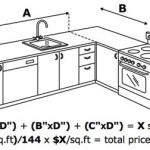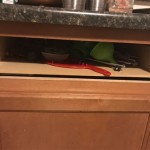Revealing the Best Natural Cleaners for Your Kitchen Cabinets
Keeping your kitchen cabinets pristine and germ-free can be a daunting task. However, with the right cleaner, it can be effortless and eco-friendly. Natural cleaners not only protect your cabinets from harmful chemicals but also maintain their beauty without compromising your health or the environment. Here's an in-depth guide to selecting the best natural cleaner for your kitchen cabinets:
Key Considerations for Selecting a Natural Cleaner
When choosing a natural cleaner, several factors must be considered:
- Ingredients: Choose cleaners with plant-based ingredients like vinegar, lemon juice, baking soda, or Castile soap. Avoid products containing harsh chemicals like ammonia, bleach, or chlorine.
- Cleaning Power: Ensure the cleaner is effective in removing dirt, grease, and food residue without damaging the cabinets' finish.
- Ease of Use: Opt for cleaners that are easy to apply and rinse off, saving you time and effort.
- Safety: Select cleaners that are non-toxic and pose no health risks to your family or pets.
- Eco-Friendliness: Choose cleaners that are biodegradable and do not harm the environment.
Top 5 Best Natural Cleaners for Kitchen Cabinets
Based on the key considerations, here are the top five natural cleaners recommended for kitchen cabinets:
- White Vinegar: Distilled white vinegar is a versatile cleaning solution that effectively removes grease, dirt, and stains. To use, mix equal parts vinegar and water in a spray bottle and apply to the cabinets. Allow it to sit for a few minutes before wiping it down with a damp cloth.
- Lemon Juice: Lemon juice possesses natural antibacterial and degreasing properties. Mix equal parts lemon juice and water in a spray bottle and apply it to the cabinets. Allow it to sit for a few minutes before wiping it down with a damp cloth.
- Baking Soda: Baking soda is a gentle abrasive that effectively removes stubborn stains and odors. Make a paste by mixing baking soda with a small amount of water. Apply the paste to the cabinets and allow it to sit for a few minutes. Wipe it down with a damp cloth.
- Castile Soap: Castile soap is a vegetable-based soap that is gentle on surfaces yet effective in cleaning. Mix a few drops of Castile soap in a bowl of warm water and use a sponge or cloth to clean the cabinets.
- Homemade All-Purpose Cleaner: Combine equal parts white vinegar, lemon juice, and water in a spray bottle. Add a few drops of essential oil for a refreshing scent. This versatile cleaner can be used on various kitchen surfaces, including cabinets.
Additional Tips for Cleaning Kitchen Cabinets
To maintain the pristine condition of your kitchen cabinets, consider the following additional tips:
- Clean Regularly: Clean your cabinets regularly to prevent dirt and grime from accumulating.
- Use Soft Cloths: Avoid using abrasive sponges or cloths that can scratch the cabinet finish.
- Test Cleaners: Always test cleaners on an inconspicuous area before applying them to the entire cabinet.
- Rinse Thoroughly: Rinse the cabinets thoroughly after cleaning to remove any residue.
- Dry Cabinets: Dry the cabinets immediately after cleaning to prevent water damage.
By choosing the right natural cleaner and following these tips, you can keep your kitchen cabinets looking their best while protecting your health and the environment.

How To Clean White Kitchen Cabinets 3 Best Ways Avoid Abbotts At Home

How To Clean Grimy Kitchen Cabinets With 2 Ingredients

Best Eco Cleaning S For Your Kitchen 2024 Bbc Good Food

How To Clean White Kitchen Cabinets 3 Best Ways Avoid Abbotts At Home

How To Make Non Toxic Kitchen Cleaner Loveleaf Co

My 6 Top Picks For Degreasing Kitchen Cabinets Before Painting

5 Expert Ways To Clean Wooden Kitchen Cabinets Everyday Old House

My 6 Top Picks For Degreasing Kitchen Cabinets Before Painting

How To Clean Kitchen Cabinets Everyday Skate

How To Clean White Kitchen Cabinets 3 Best Ways Avoid Abbotts At Home
Related Posts








